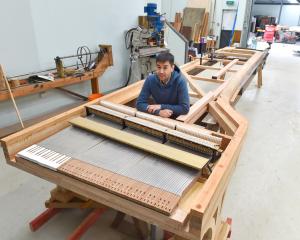
It was only once things settled down that he truly felt the effects of depression and other mental health setbacks, but his faith kept him strong.
His comments come in the wake of a University of Otago study of participants from the Christchurch Muslim community, which has found more than 60% had suffered from mental health conditions, such as PTSD and depression, in the aftermath of the 2019 mosque terrorist attacks.
On March 15, 2019, attacks at the Al Noor and Linwood Mosques left 51 people dead and many more injured.
Mr Boztas was one of the people caught in the crossfire.
He spent three weeks in Christchurch Hospital and another two weeks in Dunedin Hospital after being shot in the leg.
He was left with shrapnel in the left side of his body.
Mr Boztas, a former King’s High School student, has lived in Dunedin for 15 years.
Asked about his mental health for the first two years after the attacks, Mr Boztas said things happened "very quickly".
"Life went really fast, and I didn’t think it really affected me.
"But then, after two years, I started to feel it. I went to my GP and she put me on anti-depressants."
He still keeps in contact with many of the survivors, and in August 2020, he spoke at the sentencing of the gunman in Christchurch.
"When I went to the court, it was quite intense because we saw him face-to-face.
"We told him what we thought about him."
The study also found that almost all participants had high scores on the religious coping scale, indicating a strong engagement with the Muslim faith and suggesting that individuals utilised their religious beliefs to make sense out of their experiences.
The project, funded by the Health Research Council of New Zealand and the Canterbury Medical Research Foundation, was co-designed with Muslim researchers and involved active community engagement and collaboration with local Muslims as well as a Muslim reference group.
Lead author Dr Ruqayya Sulaiman-Hill, from the Christchurch campus’ department of psychological medicine, said the attacks left a trail of physical and psychological devastation in their wake.
"We expected there were going to be quite high levels of distress in the community — you can’t go through something as life-changing as that without having major impact on people.
"We were somewhat surprised at the scale of it.
"I mean, 61% of our sample had been diagnosed with either major depression, post-traumatic stress disorder, or anxiety disorder at some time between the attack and when we collected the data on them, and 76% had more than one condition. So that’s actually really high."
There was "huge diversity" in the types of responses from those surveyed, she said.
Another surprising finding was "post-traumatic growth", she said.
"We found it was a very interconnected community, and the personal relationships and those high social connections were actually really important in the community."
The study, published in the Australian and New Zealand Journal of Psychiatry, is the first phase of a proposed longitudinal study examining mental health effects for terror attack survivors, bereaved family members, and the wider Muslim community.
Although Mr Boztas was not one of the 189 participants interviewed, he said these findings made sense to him.
"Faith is important; it’s a big part.
"We have the brotherhood; we have the sisterhood.
"After the attack, a lot of my Christian friends were interested in coming to mosque, because they see the way we treat each other and talk to each other.’
"It’s just what the terrorist didn’t see. He thought he could break us."













